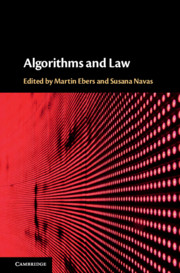Book contents
- Algorithms and Law
- Algorithms and Law
- Copyright page
- Contents
- List of Figures and Tables
- Notes on Contributors
- Preface
- Acknowledgments
- 1 Robotics and Artificial Intelligence
- 2 Regulating AI and Robotics
- 3 Regulating Algorithms
- 4 Automated Decision-Making under Article 22 GDPR
- 5 Robot Machines and Civil Liability
- 6 Extra-Contractual Liability for Wrongs Committed by Autonomous Systems
- 7 Control of Algorithms in Financial Markets
- 8 Creativity of Algorithms and Copyright Law
- 9 “Wake Neutrality” of Artificial Intelligence Devices
- 10 The (Envisaged) Legal Framework for Commercialisation of Digital Data within the EU
5 - Robot Machines and Civil Liability
Published online by Cambridge University Press: 04 July 2020
- Algorithms and Law
- Algorithms and Law
- Copyright page
- Contents
- List of Figures and Tables
- Notes on Contributors
- Preface
- Acknowledgments
- 1 Robotics and Artificial Intelligence
- 2 Regulating AI and Robotics
- 3 Regulating Algorithms
- 4 Automated Decision-Making under Article 22 GDPR
- 5 Robot Machines and Civil Liability
- 6 Extra-Contractual Liability for Wrongs Committed by Autonomous Systems
- 7 Control of Algorithms in Financial Markets
- 8 Creativity of Algorithms and Copyright Law
- 9 “Wake Neutrality” of Artificial Intelligence Devices
- 10 The (Envisaged) Legal Framework for Commercialisation of Digital Data within the EU
Summary
The legal consideration of a robot machine as a ‘product’ has led to the application of civil liability rules for producers. Nevertheless, some aspects of the relevant European regulation suggest special attention should be devoted to a review in this field in relation to robotics. Types of defect, the meanings of the term ‘producer’, the consumer expectation test and non-pecuniary damages are some of the aspects that could give rise to future debate. The inadequacy of the current Directive 85/374/EEC for regulating damages caused by robots, particularly those with self-learning capability, is highlighted by the document ‘Follow up to the EU Parliament Resolution of 16 February 2017 on Civil Law Rules on Robotics’. Other relevant documents are the Report on “Liability for AI and other emerging digital technologies” prepared by the Expert Group on Liability and New Technologies, the “Report on the safety and liability implications of Artificial Intelligence, the Internet of Things and Robotics” [COM(2020) 64 final, 19.2.2020] and the White Paper “On Artificial Intelligence – A European approach to excellence and trust” [COM(2020) 65 final, 19.2.2020].
Information
- Type
- Chapter
- Information
- Algorithms and Law , pp. 157 - 173Publisher: Cambridge University PressPrint publication year: 2020
Accessibility standard: Unknown
Why this information is here
This section outlines the accessibility features of this content - including support for screen readers, full keyboard navigation and high-contrast display options. This may not be relevant for you.Accessibility Information
- 12
- Cited by
